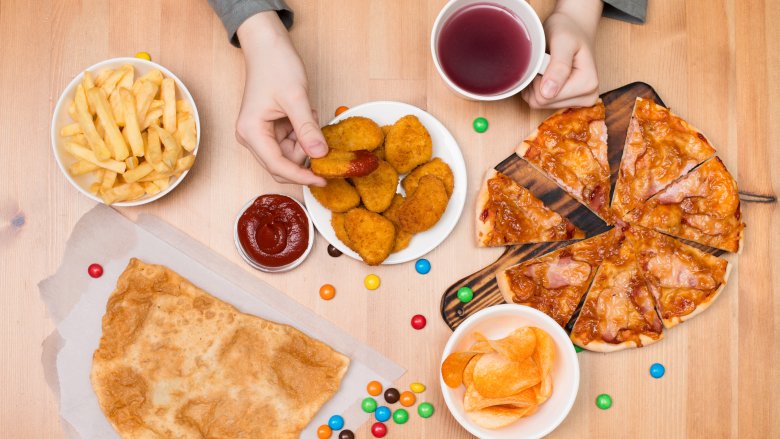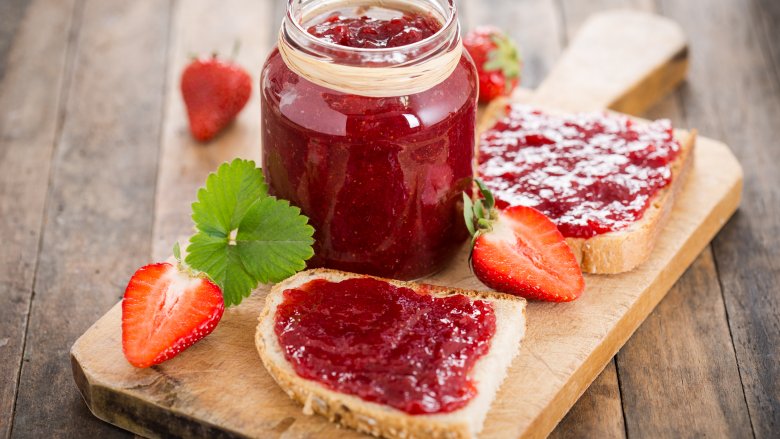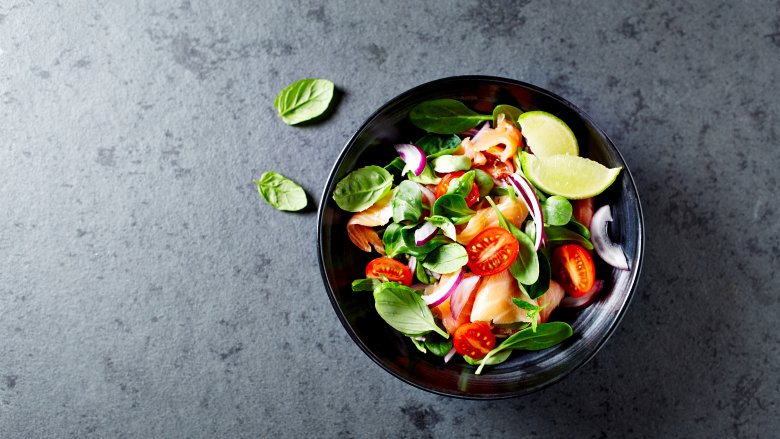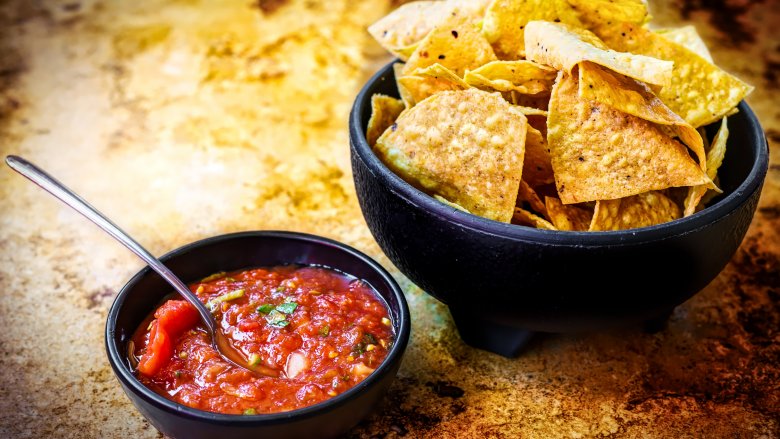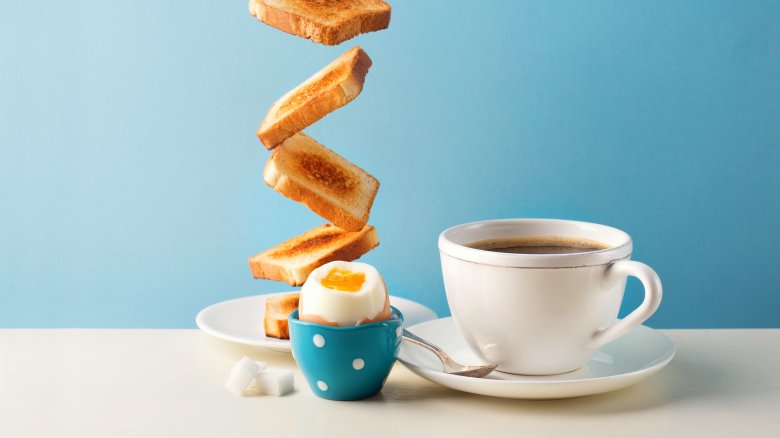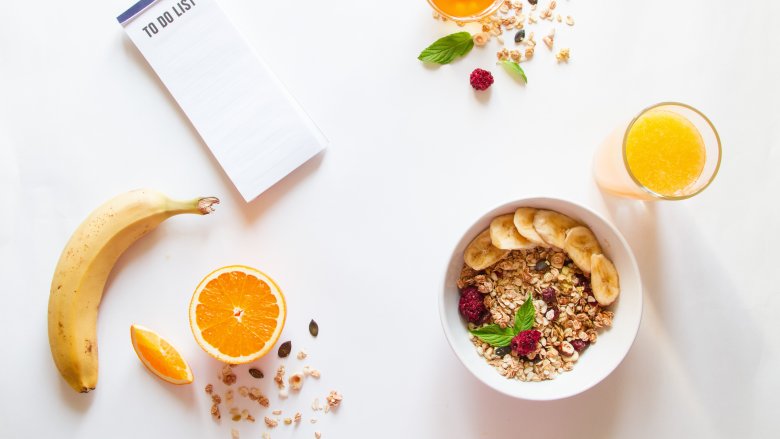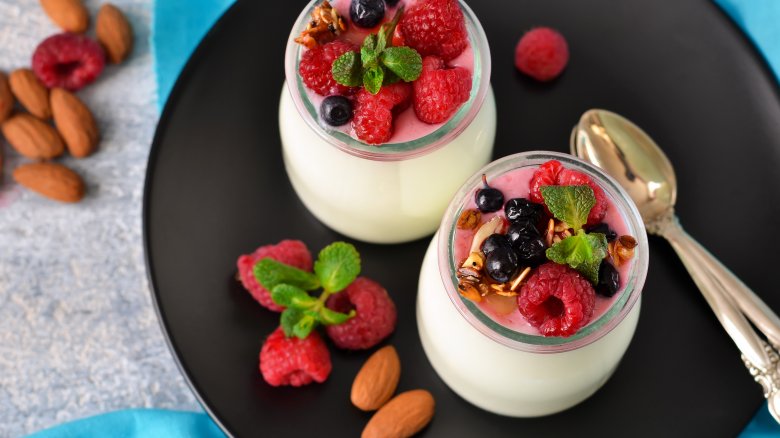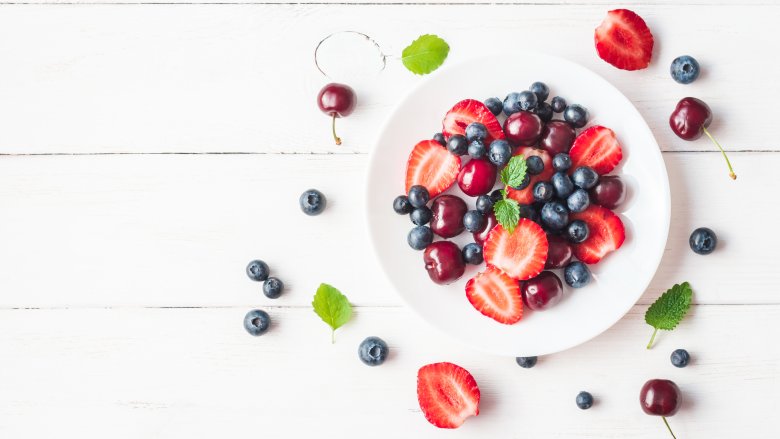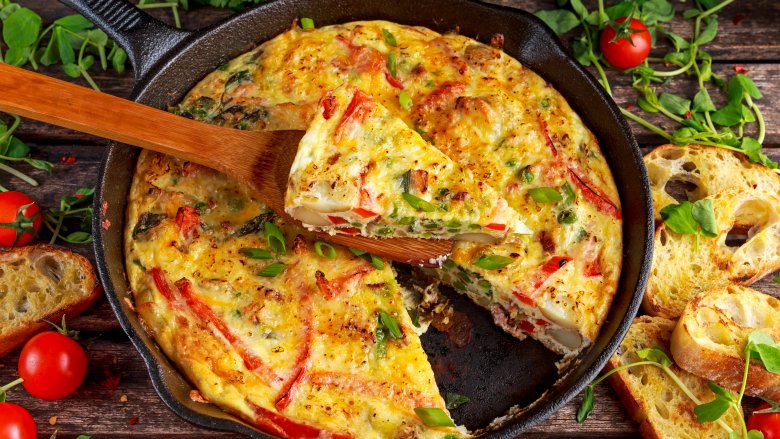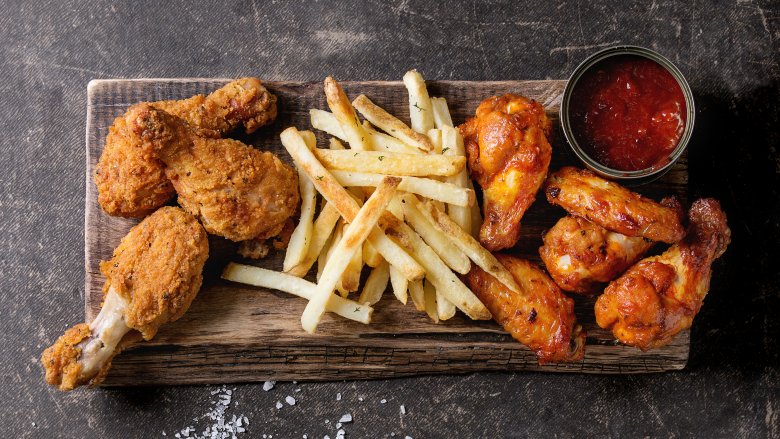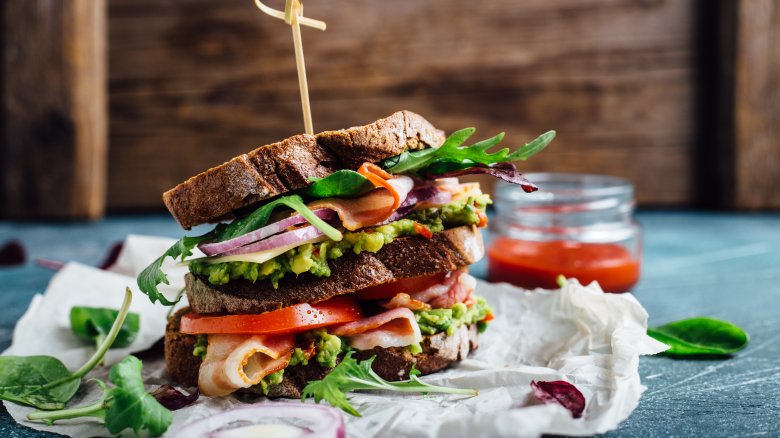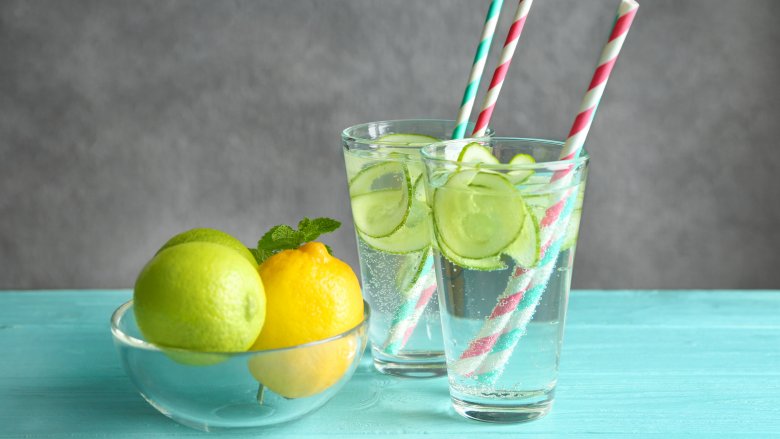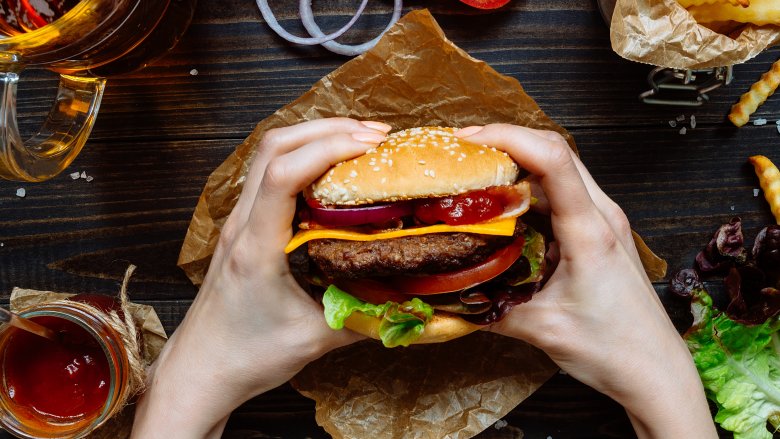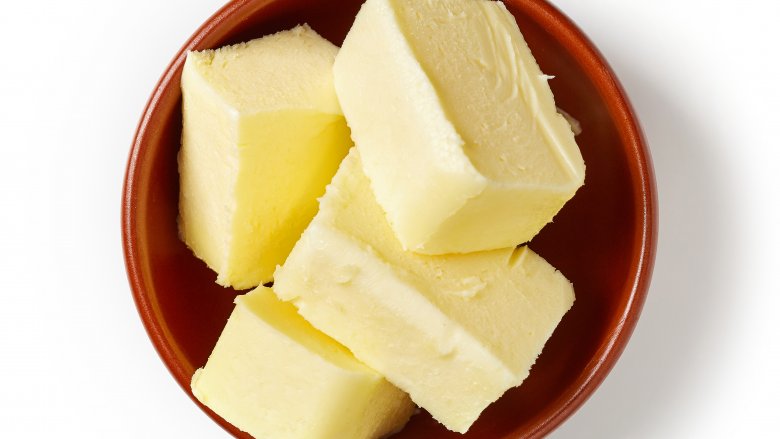Food Combinations That Are Terrible For Your Health
I have to admit it was a bit painful to write this one. I feel like the bearer of bad news, because turns out there are a lot of tasty food combinations that are terrible for your health. Sometimes when we combine two amazing foods, their health risks together are greater than the sum of their parts.
Combining the wrong foods can lead to slower digestion, altered gut bacteria, and even illness. I would never tell you to give up all of these combos, but start paying attention to how you feel after eating them.
Soda and pizza
No offense to your high school self, but your past diet of pizza and soda was incredibly bad for your health. "Soda and pizza, or anything with high fructose corn syrup, and refined carbs increases false hunger pangs and decreases satiety," explained hysician, health coach, and chef Colin Zhu, DO told me.
So even if you ate a huge meal of pizza, the sugars in the soda could keep you from feeling full. Ever wonder how you ended up polishing off that entire pizza? Now you know.
White bread with jam
While white bread and jam is a quick and easy breakfast, the combination will leave you wanting more. "A high-sugar combination at the start of your day can ultimately cause you to overindulge," registered dietitian Allison Stowell told Woman's Day. "When you start your day without protein and with very little fat, you're vulnerable to overeating for the rest of your day as your body plays catch up." Try adding in some protein with turkey bacon or nut butter and healthy fat like avocado.
Salad and low-fat dressing
Salad and low-fat dressing seem like an incredibly healthy combination, but it's lacking vital nutrients for your body. "Eating a salad with low-fat dressing seems to be as healthy as you can get. But a recent study shows that eating vegetables without any fat doesn't allow your body to take advantage of all of a salad's nutrition. You may be depriving your body of carotenoids like alpha carotene, beta carotene, or lycopene," shared nutritionist Claire Martin, RD.
Other ways to incorporate healthy fats into your salad include adding sliced avocado, nuts, or fresh salmon. "Fresh greens and veggies are loaded with great minerals and vitamins. Certain vitamins, namely vitamins A, D, E, and K are fat-soluble, meaning they get absorbed and utilized in your body along with fat," Amanda Frick, lead naturopathic doctor for Harvey Health, told me. "If you're skimping on the fat with your veggies, you're missing out on the utilization of these nutrients in your body. Drizzle some olive oil, or add some avocado to help maximize your salad nutrition."
Chips and salsa
This may have been my least favorite discovery. Chips and salsa are actually an unhealthy combo, because they lead to overeating. "Your craving for salt is likely stronger than your willpower to walk away from the chip bowl, resulting in many calories consumed," registered detitian Allison Stowell told Woman's Day. And while the salsa is low in calories, it doesn't have the fat or protein to help you feel full, leaving you hanging around the snack table all night instead of getting out and socializing at the party. Instead try a small number of chips with guacamole to feel full and move on.
Wine with dessert
I know, this just keeps getting worse. Enjoying a glass of wine with dinner is one thing, but when you have it with dessert, your body simply cannot handle that sugar overload. Having a sugary alcohol drink like wine with a slice of cake results in extra fat in the body. This is because the wine causes our insulin levels to spike, leading to our bodies storing the dessert as fat. "Instead, have wine with low-glycemic foods, such as vegetables, which reduce alcohol's sugar surge," J. Shah, MD, bariatric physician and medical director of Amari Medical, told Woman's Day. So in this case, you can have your cake and eat it too, so long as you hold the wine.
Iron-rich foods with coffee
I love a big brunch get together with friends, and for us that always means omelets and coffee. Unfortunately that combo is affecting the digestion of our entire meal. "The polyphenols and tannins in teas and chlorogenic acid in coffee block the absorption of iron by your body by binding with the iron during digestion. If you drink tea or coffee frequently after your meal, you could be making yourself anemic by inhibiting the iron absorption from what you ate," said nutritionist Claire Martin. "Many women show lower levels of iron, especially during menstruation, when a lack of iron can contribute to fatigue and mood swings. Drink less tea and coffee or try to drink it an hour before a meal, rather than after if you want to optimize iron absorption." So our new brunch plan will include coffees before making the omelets.
Cereal and orange juice
There's no easier breakfast combo than cereal and orange juice, but these two do not belong together. "Acids in orange juice or any acid fruits destroy the enzyme that is responsible for digesting starches present in cereal. Also, acidic fruits or juices can curdle milk and turn it into a heavy mucus-forming substance," certified wellness coach Nadya Andreeva wrote in Mind Body Green. "To keep your breakfast healthy, try having fruit or orange juice 30 minutes before the oatmeal." I would say that visual of a "heavy mucus-forming substance" is enough to make all of us give up the cereal-juice combo right here, right now.
Yogurt with berries
A bowl of yogurt and berries sounds like a healthy breakfast, but it can actually interfere with your digestion. Having tart berries with your morning yogurt slows down your digestion and can even affect the healthy bacteria in your gut. This bacteria affects our immune systems, which means your parfait could even lead to respiratory symptoms like a cold or allergies.
Fruit with meals
Fruit always sounds like a smart addition to any meal. Our kids are not big vegetable people, so they have fruit with just about any meal. When I add a handful of grapes to their meal of mac and cheese and animal crackers, it helps me sleep at night. However, the fruit may be messing with their digestion.
"Fruit is essentially a colorful, beautiful, and nutrient-rich sugar. Fruit is easy to break down in your stomach and is mostly digested in your intestines. Melons in particular should be eaten separately from other foods," Frick told me. "If you have fruit with a meal such as strawberry salad, salmon with mango salsa, or a fruit and yogurt parfait, the fruit will be held up in your digestive tract by the other fats and proteins and ferment the other foods. This could lead to gas, bloating, flatulence, and lethargy."
Protein and more protein
Even though bacon and cheese omelets are delicious, they contain way too much protein for our bodies to digest all at once. "In general protein/protein combinations are not recommended. One single concentrated protein per meal is easier to digest and won't require as much energy," certified wellness coach Nadya Andreeva wrote in Mind Body Green. "Go for veggie omelet instead." If you can't give up that bacon, try enjoying it on toast with avocado and sliced tomato.
Fried food with starches
Pairing fried foods with starchy carbohydrates is always delicious, but never advised. "Fried food or animal protein with starch, such as chicken and waffles or steak and mashed potatoes, increases risk of diabetes," physician, health coach, and chef Colin Zhu, DO told me. It's best to choose one indulgence at your meal, rather than loading your plate up with every artery-clogging food you can get your hands on.
Deli meats and bread
Oh and while we're at it, your go-to lunch is terrible too. Combining deli meats with carbohydrates like bread or wraps is putting your health at risk. "Deli meats in any sandwich combination increases the risk of gastric cancer," Dr. Zhu told me.
Water with meals
As a constant water-drinker, I was surprised to hear we shouldn't be having it with our meals. "Drinking water with your meal or right after is a norm here in the United States, but water can worsen GERD, cause bloating, and interfere with the digestion of your food," nutritionist Claire Martin told me. "Your stomach is a highly acidic environment where hydrochloric acid breaks down what you consume. When you drink a lot of water, you risk changing the acidity of your stomach and hindering the breakdown of your food. In a healthy gastrointestinal system, all food consumed is being broken down and the nutrients are being optimally absorbed by the body, and the waste is passed. So when you aren't breaking down your food, it can affect your whole GI tract functions and digestive system, causing bloating, gas, and general discomfort."
Of course it's OK to take sips of water with your meal, but Martin recommended drinking a glass of water about 30 minutes before or after your meals to prevent the bloat.
Meat with carbs
One reason why two foods can make a terrible combination is because your body needs to digest them in very different ways. This is especially true when it comes to meat and carbohydrates. "Never eat a burger and fries, spaghetti and meatballs, or pizza. Proteins require a much different environment in the stomach to digest properly than do starches. They also require totally different types of digestive enzymes," explained Frick. "Having both at the same time has a mutual cancellation effect, so that neither can be digested properly. This can cause major indigestion, discomfort, acid reflux, and bloat. Try to wait two to three hours between eating these two food groups to ensure proper digestion and absorption."
This might be hard advice to follow, but pay attention to how your body reacts to meals that mix meats and carbs — it might be the solution you've been looking for.
Butter and fried oil
Can't you just hear Paula Deen crying over this one? You may have guessed it, but combining butter and fried oil is not going to do your heart or overall health any favors. "Deep fried butter is a midwestern fair food, also found in bars as an appetizer, that might be competing for a top slot in the unhealthiest of foods contest. This is whipped butter dipped in a flour batter and then fried in heated oil, essentially epitomizing all of the unhealthy extremes in American food habits," nutritionist Claire Martin told me. "High in calories and saturated fats, with no nutritional benefit that could begin to offset the negatives, this food is a heart attack waiting to happen."
I'm not going to lie. I thought this sounded disgusting when I first heard of it, but I bet it's pretty delicious. However, if you've never tried it, probably best to just abstain and never know what you're missing.
